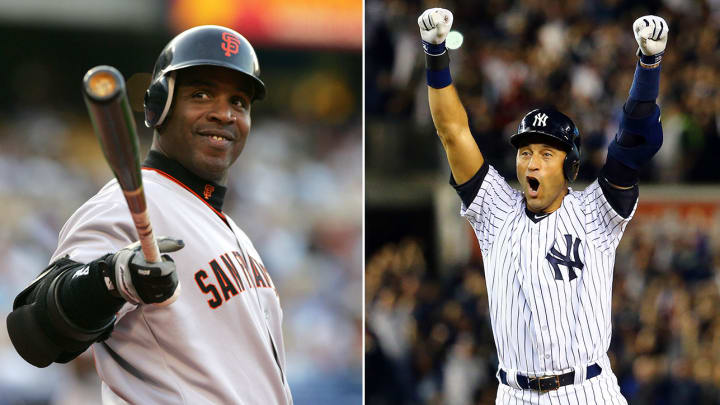Baseball Hall of Fame Inductions Are Heading for a Bleak Period

Anyone heading to Cooperstown, N.Y., for this year’s Baseball Hall of Fame inductions should bring plenty of drinks and snacks as well as the comfiest chair they can carry, because Sunday’s festivities may take quite a while. With five men—Mariano Rivera, Edgar Martinez, Mike Mussina, Lee Smith and Harold Baines—joining the Hall along with the deceased Roy Halladay, the stage will be crowded, and the afternoon will feature plenty of speeches. That’s nothing new: In the last six years, the Hall has been cranking out bronze plaques, swelling its ranks by 29 (20 via the BBWAA ballot, the rest through the era-based Veterans Committees), or as many as had been added in the entire decade prior, excluding the 17 Negro Leaguers who were mass inducted in 2006.
That flood of Hall of Famers was both overdue and quite helpful. Elections had slowed to a crawl in the two decades prior, with the norm each summer being only one or two players joining Cooperstown’s ranks. Occasionally, visitors for induction weekend would get no one at all to cheer: In 2013, the Hall welcomed only Veterans Committee choices, all three of whom were dead.
The result of the BBWAA’s inaction was a ballot stuffed with too many deserving candidates, leaving writers forced to perform triage in choosing from as many as 20 Hall-worthy players despite a 10-vote limit. But a good chunk of that glut has been cleared since 2014; the BBWAA has elected more players in that span than in any other six-year stretch in its voting history. The 2019 election continued that trend, with two first-ballot choices in Rivera and Halladay joined by longtime holdovers Mussina (in his sixth year of eligibility) and Martinez (facing his 10th and final winter of consideration).
All of that makes for a much livelier summer and is better both for the Hall and for baseball history. But this sextet may be the last wave of that late 2010s ballot flush, as future years are looking sparser in terms of providing new Hall of Famers.
Start with the 2020 ballot, which features 14 returning players from last year along with a yet-to-be-determined number of first-year candidates. Which of those guys make the cut won’t be revealed until the official ballot comes out in November, but you don’t need to wait for the Hall’s announcement to know who’s eligible for consideration. That information is available on the indispensable Baseball-Reference, which has projected ballots all the way out to 2023.
For this coming winter, one newcomer stands out above the rest: Derek Jeter. The Yankees’ shortstop is as much of a lock for Hall election as his former teammate Rivera, the first man to earn 100% of the vote. Whether Jeter can match him in that feat remains to be seen, but regardless, he’s going in with ease.
But next July’s celebration may be a one-man affair. There are some notable first-time names that will likely make the ballot—including Bobby Abreu, Jason Giambi, Cliff Lee, Josh Beckett, Eric Chavez, and Alfonso Soriano—but don’t expect any of them to join Jeter in earning a first-ballot nod. Beyond Jeter, only Abreu and Giambi come close to the Hall standards (and I’ll note here that I’m using Jay Jaffe’s JAWS stat as my quick and dirty measuring stick for that purpose), and neither is a slam dunk.
That theoretically opens the door for the men returning to the ballot to earn extra votes, but no one from that crew is on the doorstep of election. The highest vote earner left over from last year is Curt Schilling, who took home 64.7%. That’s creeping up to election, and it represents another surge for the ex-Phillies and Red Sox righthander after he shot his own candidacy in the foot with his moronic, racist comments in 2015 and ’16. But even with that, Schilling was still 60 votes shy of the 75% threshold (or 319 of the 425 ballots that were cast). He’s won back a surprising number of voters in the last two years, but a similar result as 2019 (when he gained 34 votes from the year prior) would still leave him 20–30 short of election. His odds are good for an eventual election, but he may have to wait until 2021, his ninth year on the ballot, to get over the hump.
The next closest men to the Hall last winter were Barry Bonds and Roger Clemens. I’d rather stick my tongue in a deli meat slicer than revisit their exhausting campaigns and the controversy around them. Suffice to say that they’ve been stuck in neutral over the last two cycles, seeing their vote total climb from 53.8% and 54.1 in 2017, respectively, to just 59.1 and 59.5 in ’19. A 2020 election isn’t going to happen, and neither is adding support at fast enough a rate to make me feel confident that, with just three years left on the ballot, they’ll ever get in.
And so begins the best week of the year! To celebrate the upcoming #HOFWKND let’s take a look at the magic that is Cooperstown. https://t.co/3W0kAZX7Vw
— National Baseball Hall of Fame and Museum ⚾ (@baseballhall) July 15, 2019
That leaves one final possibility to join Jeter in Cooperstown next summer: Larry Walker. Once an afterthought on the ballot as recently as 2017, the former Expos and Rockies slugger has suddenly found helium, jumping to 59.7% of the vote last year. It’s a remarkable rise reminiscent of Martinez and Tim Raines, but the mountain in front of Walker remains dauntingly tall. Despite adding 73 votes—67 returning voters and six new ones—from 2018 to ‘19, Walker was still 87 away from 75%. That’s a monstrously huge number: No player in election history has ever gained that many in one cycle. Worse for Walker, he’s out of time, as this winter will be his 10th and final year on the ballot.
The odds are high, then, that Jeter will be the lone honoree this time next year (along with whoever the era-based committee chooses, but there’s no potential ballot to study for that). But 2020 may not be the only year of slim pickings. The prospective 2021 ballot includes no first-year players with Hall credentials. The best new names likely to show up are Tim Hudson, Mark Buehrle and Torii Hunter—great players, but all short of the JAWS standard at their respective positions, and none bearing the big traditional numbers that voters usually reward.
There’s a chance, then, that 2021 could be another one-man BBWAA class, this time in the person of Schilling. Bonds and Clemens have an outside chance of joining him, but the better bet that year is Omar Vizquel, who has steadily climbed since debuting on the ballot in 2018 and finished with 42.8% of the vote last year. A relatively uncontroversial candidate, Vizquel is a favorite among the older crowd, earning more votes on private ballots than those publicly released, and has an easy hook as one of the best defensive shortstops of all time.
The issue, though, is that beyond Schilling, Bonds, Clemens, Walker and Vizquel, the rest of the ballot is either not gaining traction or still has a long way to go. Manny Ramirez, Gary Sheffield and Sammy Sosa are effectively DOA thanks to their PED connections. Jeff Kent hasn’t cracked 20% of the vote despite six years on the ballot and is borderline at best. Scott Rolen, Todd Helton and Billy Wagner are arguably Hall-worthy, but their cases are tougher to appreciate. And there’s no real hope for Andruw Jones and Andy Pettitte, who barely escaped falling off the ballot last winter.
10 years of Hall of Fame memories and more to come this weekend!@baseballhall | #MLBN10 | #TBT pic.twitter.com/h44BbfR43B
— MLB Network (@MLBNetwork) July 18, 2019
The upcoming first-year players, meanwhile, are a relatively uninspiring lot. Beyond Jeter, the best names due in the next three years are Alex Rodriguez, David Ortiz, and Carlos Beltran. Rodriguez promises to be the most polarizing Hall debate yet, and one who will run into the same problems that have dogged Bonds, Clemens and the rest of the Steroid Era superstars. Ortiz has his postseason brilliance and reputation in his favor, but as a designated hitter, he’ll have detractors, though he should eventually get in. The same is true of Beltran, who is a deserving first-ballot choice but spent his entire career being undervalued and occasionally maligned by writers and fans alike. Beyond that trio, you’re banking on writers over-appreciating great yet not elite players like Hudson, Buehrle, Hunter, Mark Teixeira and Joe Nathan.
The end result is that, from 2020 through ’23, the total number of elected Hall of Famers could be as low as five: Jeter, Schilling, Vizquel, Ortiz and Beltran. Rodriguez, Bonds and Clemens could bump that up (and, in an instance of the universe aligning perfectly, A-Rod’s first year on the ballot will be the last one for Bonds and Clemens), but the odds are against them. Fans should prepare for some fallow summers once again in Cooperstown.
It’s not all bad, though. The weak first-year classes on the horizon open up opportunities for overlooked players like Abreu, Rolen, Wagner and Helton to pick up votes. The short-term loss for the Hall and those who make the trek to upstate New York could be a long-term gain for guys deserving of a plaque but are buried by a backlog that has finally and thankfully been cleared.
